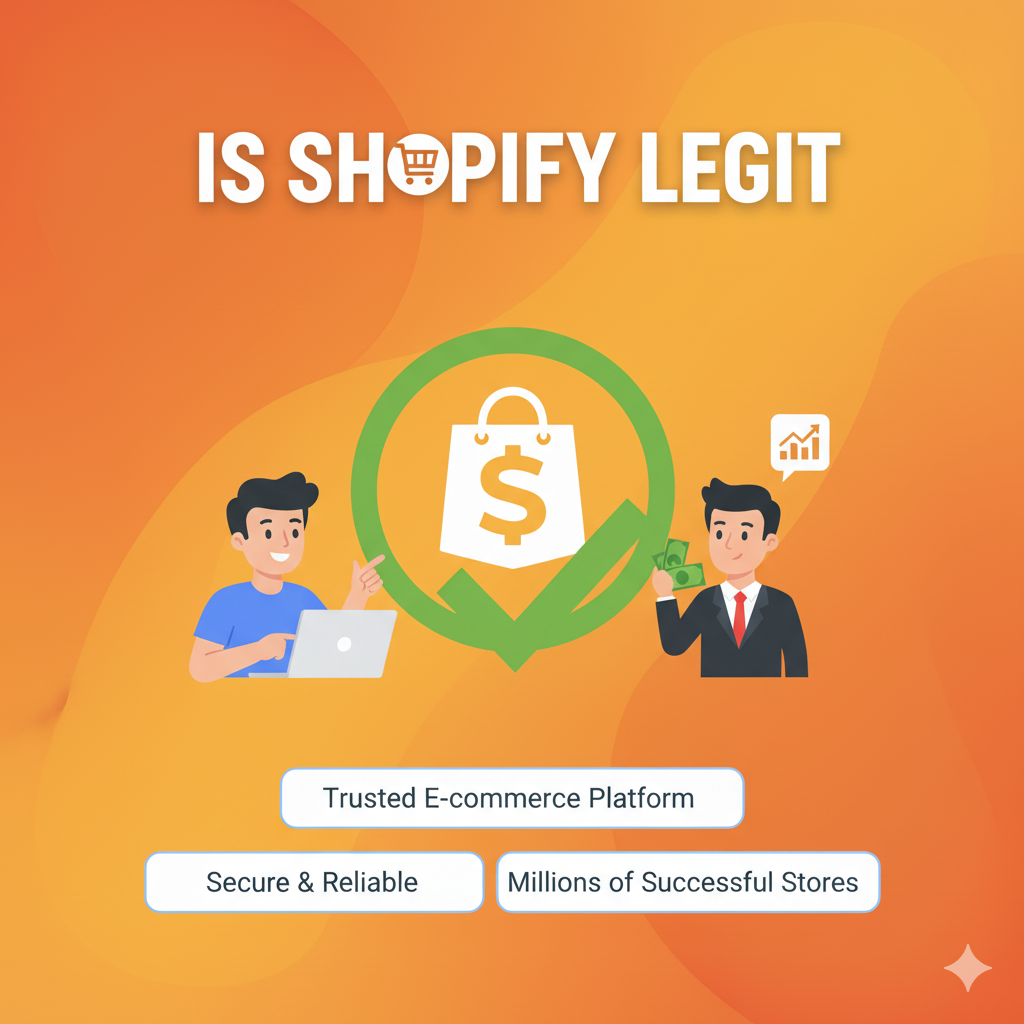If you’ve been thinking about starting an online store, chances are you’ve heard of Shopify. It’s everywhere from YouTube tutorials to small business success stories. But with so many e-commerce platforms out there, it’s natural to wonder:
Is Shopify actually legit, or is it just overhyped?
Let’s clear that up. In this article, I’ll break down what Shopify really is, how it works, what makes it trustworthy, and where you should be cautious so you can decide for yourself whether it’s right for your business.
What Exactly Is Shopify?
Shopify is a legitimate e-commerce platform that allows anyone to create an online store without coding skills. It launched in 2006 and has since grown into one of the most popular e-commerce platforms in the world, powering over 4 million businesses globally.
In simple terms:
- You can build your store,
- List and sell products,
- Accept payments, and
- Manage inventory and shipping all from one dashboard.
Shopify is trusted by everyone from solo entrepreneurs to big brands like Gymshark, Kylie Cosmetics, and Allbirds.
Is Shopify Legit for Beginners?
Absolutely Shopify is one of the easiest and most reliable platforms for beginners to start selling online.
Here’s why:
- No technical knowledge required: You don’t need to know coding or design.
- Pre-built templates: Professionally designed themes make your store look polished.
- Built-in tools: From SEO to payments and marketing, everything is included.
- 24/7 support: Shopify offers round-the-clock customer support via chat, email, or phone.
So yes — Shopify is 100% legit for anyone starting from scratch.
Why Shopify Is Considered Legit and Safe
When you’re dealing with online payments and customer data, security matters. And this is where Shopify shines.
Here’s what makes Shopify trustworthy:
- Secure Payment Processing
Shopify Payments is PCI DSS Level 1 compliant — the highest security standard for handling credit card transactions. Your store and your customers are protected from fraud and data leaks. - SSL Encryption
Every Shopify store comes with a free SSL certificate. That means your site runs on “https://” — keeping user data encrypted and secure. - Trusted by Millions of Businesses
Shopify isn’t some shady startup. It’s a publicly traded company listed on the New York Stock Exchange (SHOP) with billions in annual revenue. - Transparent Pricing
Shopify’s plans and fees are public. You know exactly what you’re paying for — there are no hidden tricks. - Extensive App Ecosystem
With over 8,000 trusted apps in the Shopify App Store, you can extend your store safely using verified tools.
What You Should Watch Out For
Now, while Shopify is totally legit, there are a few things to be aware of — especially for new sellers.
1. Monthly Fees Add Up
Shopify’s pricing starts at around $39/month, but with apps, themes, and transaction fees, your total cost can rise quickly. Always budget before you scale.
2. You Don’t Own the Platform
You own your products, customers, and brand — but not the Shopify platform itself. If you ever close your account, your site goes offline immediately.
3. Learning Curve with Features
Although Shopify is beginner-friendly, understanding all its features (SEO, taxes, apps, etc.) can take some time.
4. Beware of “Scam Stores,” Not Shopify
Some fake stores use Shopify to run scams — but that’s not Shopify’s fault. The platform itself is legit; the issue is with certain merchants. Always check reviews and refund policies before buying from unknown Shopify stores.
Real Proof That Shopify Is Legit
Here are a few numbers and facts that speak for themselves:
- Over 700 million buyers have made purchases from Shopify stores.
- Shopify processed over $235 billion in sales in 2024 alone.
- The platform powers major global brands and small local stores alike.
- Shopify’s uptime is around 99.9%, meaning your store almost never goes down.
In short: Shopify isn’t just legit it’s one of the most reliable e-commerce solutions in the world.
Who Shopify Is Best For
Shopify works best for:
- Small businesses that want an easy setup
- Dropshippers who use apps like DSers or Spocket
- Creators and digital sellers using Shopify Digital Downloads
- Growing brands needing scalable tools and analytics
If you just want a simple, secure, and flexible way to start selling online — Shopify is a solid choice.
Alternatives to Shopify (If You’re Curious)
Shopify is great, but not your only option. Here are some alternatives depending on your goals:
- WooCommerce: Better for those who want full control (and already use WordPress).
- Wix eCommerce: Great for small shops with simple needs.
- BigCommerce: Best for larger stores with complex catalogs.
- Etsy: Perfect for handmade or vintage products, but limited customization.
Still, when it comes to all-in-one e-commerce power, Shopify leads the pack for most users.
Wrap Up
So, is Shopify legit?
Yes — absolutely.
It’s one of the most secure, trusted, and beginner-friendly e-commerce platforms out there. Shopify gives you everything you need to launch and grow your online business — from product pages to payments to marketing.
Just remember to:
- Choose your plan wisely,
- Avoid unnecessary app costs, and
- Keep learning how to optimize your store for better results.
If you’re serious about selling online, Shopify isn’t just legit it’s one of the best tools you can invest in.
Key Takeaways
- Shopify is 100% legitimate and trusted by millions worldwide.
- It’s beginner-friendly, secure, and scalable.
- Watch out for rising app costs, but the platform itself is reliable.
- Perfect for small businesses, dropshippers, and digital creators.
FAQs
Yes — it’s safe to purchase from Shopify-powered stores. Shopify itself is a legitimate and secure e-commerce platform that uses SSL encryption and PCI-compliant payment systems to protect transactions.
However, it’s important to note: Shopify hosts stores, but each store is independently owned. That means while Shopify is safe, not every seller might be trustworthy. Always check the store’s reviews, contact info, and policies before buying.
Absolutely. Shopify is a publicly listed company (NYSE: SHOP) with millions of active merchants and billions in annual sales. The platform follows strict security protocols and offers world-class reliability.
You can trust Shopify as a platform — but always evaluate the individual store you’re buying from. Shopify provides the tools, but each merchant runs their own business.
Shopify itself usually doesn’t issue refunds directly to buyers, because it’s not the seller — it’s just the platform provider.
If you believe you were scammed by a Shopify store, you can:
First, contact the store owner through their site or email.
If they don’t respond, contact your payment provider or bank to dispute the charge.
You can also report the store to Shopify through their Report a Merchant page so Shopify can investigate or suspend it.
Shopify takes fraud reports seriously, but refunds are handled through your bank or card issuer, not Shopify itself.
Shopify’s biggest challenge for many sellers is the cost of add-ons.
While the basic plan is affordable, many features (advanced analytics, upsells, subscriptions, etc.) require paid apps. Over time, these can add up — especially for small businesses.
Another common issue is limited design flexibility compared to open-source platforms like WooCommerce. You can customize a lot, but not everything unless you’re comfortable editing Liquid code.
Shopify is actually priced to be accessible, not “cheap.”
Its plans start low because it’s a subscription-based platform, meaning Shopify makes money monthly, not upfront. This allows small businesses to start with minimal investment.
Also, Shopify runs on a shared hosting model, where thousands of stores use the same infrastructure — keeping prices lower for everyone.
Just remember: while the base price looks affordable, apps, themes, and transaction fees can increase the total cost.
If you’re a store owner, Shopify offers a refund only for certain cases — like billing errors or if you cancel within the trial period (you can’t usually get a refund for past months).
If you’re a buyer, Shopify doesn’t handle refunds directly. You’ll need to:
Request a refund from the seller first.
If that fails, contact your bank or card provider for a chargeback.
Optionally, report the store to Shopify Support for review.
Always read refund policies on the specific store before purchasing.
Here are a few quick ways to verify if a Shopify store is legitimate before buying:
Check for HTTPS: The URL should start with https:// and show a secure padlock icon.
Look for contact info: A real store will have an email, address, or social media links.
Search for reviews: Type “storename + reviews” on Google or Trustpilot.
Check policies: Legit stores have clear refund, shipping, and privacy policies.
Avoid unrealistic prices: If a deal looks too good to be true, it probably is.
If you’re unsure, skip the purchase or use a payment method with buyer protection (like PayPal or a credit card).
Good question — this confuses a lot of people.
Shopify is the main platform (the company and service you sign up for).
MyShopify is the default subdomain Shopify gives your store when you create it.
For example:
If your store name is “TrendyTees,” Shopify gives you a temporary URL like:
👉 trendytees.myshopify.com
Once you buy your own custom domain (like trendytees.com), that’s what customers will see — but the “myshopify.com” domain still exists in the background for admin purposes.
So “MyShopify” is not a different website or company — it’s just the internal domain used by Shopify stores.

